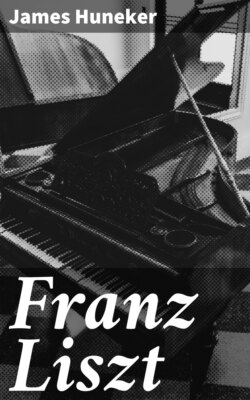Читать книгу Franz Liszt - James Huneker - Страница 18
На сайте Литреса книга снята с продажи.
I
ROME
ОглавлениеTable of Contents
The Roman candle has attracted many spiritual moths. Goethe, Humboldt, Platen, Winckelmann, Thorwaldsen, Gregorovius and Liszt—to mention only the first at hand—fluttered to Rome and ascribe to it much of their finer productivity. For Franz Liszt it was a loadstone of double power—the ideality of the place attracted him and its religion anchored his spiritual restlessness.
Liszt liked a broad soul-margin to his life. Heine touched on this side of Liszt's character when he wrote of him: "Speculation has the greatest fascination for him; and still more than with the interests of his art is he engrossed with all manner of rival philosophical investigations which are occupied with the solution of all great questions of heaven and earth. For long he was an ardent upholder of the beautiful Saint-Simonian idea of the world. Later the spiritualistic or rather vaporous thoughts of Ballanche enveloped him in their midst; now he is enthusiastic over the Republican-Catholic dogmas of a Lamennais who has hoisted his Jacobin cap on the cross. … Heaven knows in what mental stall he will find his next hobby-horse!" This was written in 1837, and only two years afterward Liszt paid his first visit to Rome.
Based on letters and diaries of Liszt, Gregorovius, Ad. Stahr, Fanny Lewald, W. Allmers, Cardinal Wiseman, Jul. Schnorr von Carolsfeld, and Eugen Segnitz, a study of Franz Liszt in Rome may be made.
The time spent in the Eternal City was unquestionably an important one in Liszt's life and worthy of the detailed attention given it. Rome in 1839 presented a contradictory picture. Contrasted to the pomp of the Vatican were the unprincipled conditions of the city itself. Bands of robbers infested it and the surroundings, making it as unsafe as an English highway during the glorious but rather frisky times of Jonathan Wild and his agile confrères. So, for instance, Massocia and his band kidnapped the pupils of the seminary in Albano, and when the demanded ransom was not forthcoming defiantly strung up these innocents on trees flanking the gateways of Rome. So, too, the political freedom of the city found a concession in the privilege of Cardinal Consalvi, who permitted foreign papers of every political party to be read openly; while the papal edict declared null and void all contracts closed between Christian and Hebrew.
In matters of art things were not much better. The censor swung his axe in a most irresponsible and, now to us, laughable manner. Overbeck's Holy Family was condemned because the feet of the Madonna in it were too bare; Thorwaldsen's Day and Night was offensive in its nudeness; Raphael's art was an eyesore, and the same discriminating mind, Padre Piazza, would have liked to consign to the flames all philosophical books.
The musical taste and standard was not elevating at this time. Piccini, Paisiello, Cimarosa, Sacchini, Anfossi, Sarti, Righini, Paer, and Rossini wrote purely for the sensual enjoyment of the people.
Even the behaviour of the masses in theatres was defined by an edict issued by Leo XII. Any poor devil caught wearing his hat in the theatre was shown the door; if an actor interpolated either gesture or word not provided for in the prompt-book he was sent to the galleys for five years; the carrying of weapons in places of amusement was punishable with life sentence in the galleys, and wounding another during a row earned a death verdict for the unfortunate one; applause and hisses were rewarded by a prison term from two months to half a year.
